- Home
- Lynne Truss
Making the Cat Laugh Page 7
Making the Cat Laugh Read online
Page 7
But it’s all true. ‘Fish Have Rights’ is the latest thing in the anti-bloodsports campaign, and the British angler is the object not only of moral opprobrium but of sabotage attack. Really. There was a piece in the Sunday Times. Robert Redford has attached a disclaimer to his fly-fishing movie, A River Runs Through It, promising that no little fishies were killed, harmed, or even mildly disgruntled in the making of it, yet the 300-strong Campaign for the Abolition of Angling is still thinking to picket the cinemas (‘This film degrades fish,’ I suppose).
I had no idea of all this strength of feeling. Sitting quietly on a river bank under a big umbrella, thoughtfully masticating a cheese roll, our angler looks up in surprise to see a fully rubberized frogman advancing from the water, yelling that he is barbaric. Talk about surreal. What a way to find out that the first right of fish is the right to representation.
Personally, I could never love a fish. It is something to do with their short memories. Call me anthropocentric, but I refuse to lavish affection on a creature that, every few seconds, can’t remember where it’s seen you before. All aquarium-owners will gladly tell you that the extremely short memory-span of the fish is its great salvation in captivity, because while it endlessly circles its tank it supposedly thinks, ‘Well, this is interesting; mm, this is interesting; gosh, this is interesting; corks, this is interesting.’ But to me, that retention problem is a stumbling block to sympathy, and I doubt I shall ever march on Parliament with our amnesiac aquatic friends. ‘What do we want?’ we humans would shout. And the fish would give us that blank panicky look, as if to say, ‘How do you mean?’
On the other hand, I do agree that it is odd to call angling a sport, when there is obviously never the slightest possibility that the trout will win. The great outdoors. Man against fish. Well, you have to admit that the contest is unequal. Moreover, the idea that a fish can outwit its predator (‘Mister Carp was too clever for me today’) is not much of a face-saver, in my opinion, and I am always surprised when people resort to it. But what really astounds me in this ‘Fish Have Rights’ business is that any sane person, looking around at the world’s current brutalities, would put angling at the top of their activist agenda. Presumably they watch the news from Bosnia with their mouths open and their eyes all glassy, making little occasional ‘Pup!’ noises with their lips.
What it really boils down to, however, is that I just can’t imagine the emotional dynamic involved in wanting to sabotage an angler. How do they get their dander up (especially once they’re encased in a wet-suit)? Whereas the fox-hunt seems to have been designed in every detail to invite aggressive response (the horn! the horn!), I don’t see how anyone could work himself into a lather about a bloke with a flask of tea in a fine drizzle being willingly outsmarted by a fish. It doesn’t add up. It’s like attacking a person for quietly reading a magazine. ‘Look at him doing that! Ooh, that really makes me mad!’ The drizzle scenario is like a red rag to a bull, apparently. Which is strange, of course, because in terms of unacceptable bloodsports, a red rag to a bull is really nothing like this at all.
Attempting to cross a tricky road junction in south London recently, I was very nearly struck down by a speeding van. This is the sort of thing that makes me rather angry; in fact, had I not been carrying two heavily occupied cat-baskets at the time (one in each hand), I would have taken great pleasure in thumping the side of the van as it passed (sometimes the BANG resounds wonderfully). I still had the option, of course, of hurling a retaliatory cat-basket down the road after it, but luckily the thought did not occur to me until later. So, as I stood helpless on the tarmac, with the smouldering tyre-tracks running just inches from my feet, all I could do was squint at the receding vehicle in search of an identifying clue. And I got one. On the back of the van were two words I shall never forget: ‘Bengal’ was one, and ‘Prawns’ was the other.
As I sat in the vet’s waiting-room and attempted unsuccessfully to comfort my shuddering cats by poking at them through the wire mesh of their baskets, it seemed to me that I had had a lucky escape. Nobody wants to be killed by a van; but it would be a great deal more irritating to be killed by a van with ‘Bengal Prawns’ written on it.
‘How did she die?’ people would ask.
‘I think it was something to do with prawns.’
‘But she never liked prawns.’
‘I know.’
I couldn’t help remembering that when Chekhov’s body was returned to Moscow for burial, it was in a cart marked ‘Fresh Oysters’, but this inconsequential fact did nothing to lift my spirits, so I jiggled the cats for a bit and then hummed them a comic song until somebody asked me to stop.
I think about death sometimes. Analytically, of course. Recently, for example, I got together with a depressed friend, and we discussed – over a bottle of crème de menthe and a family bucket of Kentucky Fried Chicken – our views on suicide. It was jolly interesting. It turned out that our ideas were completely different, and that philosophers ought to have been brought in by the coach-load just to listen to us because what we said was so bloody profound. Her view, you see, was that whereas she often felt like killing herself, she didn’t actually want to die. And I said, well that was so, so, amazingly funny, because whereas I often felt that I wanted to die, I didn’t actually want to kill myself. We felt so proud of this extraordinary paradox that we treated ourselves to a large bottle of Bailey’s Irish Cream.
Perhaps the ‘Bengal Prawns’ thing was a message; a presentiment. But what could it mean? Don’t mess with prawns? One day you will die by prawns? You have taken the name of prawns in vain? I have no idea. But it turned out to be something of an epiphany, in any case; because, strangely enough, it has given me the will to carry on. No bloody prawn, I decided, is going to get the better of me.
Last autumn an Oxford man was prosecuted for strangling next door’s parrot. You may remember the item in the news. The offending bird lived in a cage in the garden, the man had recorded piercing noises from it (up to 90 decibels), and finally it drove him berserk. It was a dramatic story, really, like something from a crack-up movie starring Michael Douglas. Man in specs yells, ‘That’s it! That’s done it,’ breaks down fence, wrestles with door of cage; parrot backs away uncertainly, squawking. Music soars; feathers flurry; shadows struggle; and a bird ladder is kicked over in the fight. The music drops to a low pulse, signifying that the grisly deed is done. The man falls back, stunned, stares at palms of hands. Then silence. The camera pans: empty perch, rocking swing, silver bell, mirror, scattered Trill, cuttlefish, end.
That’s how I saw it, anyway. Here was a man pushed beyond endurance by the constant shrieks of a noisy bird (trained by its owners to squawk ‘Mark’, the strangler’s name). And although I can’t remember if he paid a terrible penalty for his crime, what I do remember is empathizing strongly with his frustrations, and thinking that the urge to strangle next door’s parrot is probably one of the most passionate feelings shared by the silent outraged majority in this inwardly seething, overcrowded and latently violent country. Naked and raw, it is, the common urge to break the windscreen of a car whose alarm has been wah-wahing all night; to firebomb a house where a party never stops. Thank God they don’t let us have guns.
And now we have the case of Diane Welfare, fined £12,500 last week for broadcasting Radio 1 to her neighbours, amid general cheers that something is finally being done. Hurrah, hurrah. If the court had also burst through the door shouting, ‘That’s it! That’s done it!’ and strangled the stereo or drowned it in the bath, I think I would be literally singing with joy. I don’t care that Miss Welfare can’t pay the fine. I don’t even care that she is a teenage mother with a rotten life. When someone blasts noise at their neighbours, it is selfish and aggressive, and it drives you wild. It gets in your face. Nowadays when new neighbours move in downstairs from me, I cut the usual cheery preliminaries and just demand straight off to see the size of their speakers. Anything larger than a cornflake packet and my life is r
uined. I will have to write in restaurants and sleep in the car.
A man next door to my mother drilled and hammered for two solid years, just beyond the four-inch dividing wall. ‘Evidently he’s fitting [WAR OOOUM, WAR OOOUM] tongue-and-groove pine panelling [whack, whack, whack] all round the living-room,’ yelled my parents, grown pale and jumpy within a fortnight. Six months later, he was still at it. My parents went for walks, turned up the volume on the telly, and never complained because basically they were scared. Meanwhile, by their calculations, the driller ought to have finished going once round the room, so was presumably going round again. As the months turned to years and he didn’t stop, we started to shake our heads and speculate. Either this man was a lunatic, or he had accidentally panelled across the doorways, and was now trapped for ever, drilling and hammering and adding planks, in an ever-shrinking upright coffin of his own construction. This latter hypothesis pleased us considerably, as it suggested the exercise was finite. Years in the future, we decided, he would be discovered by archaeologists and transferred to a museum still in his six-foot-thick pine box, perfectly preserved in a hammering position, with nails between his teeth.
You notice how neighbours of serial killers always gasp and shake their heads, ‘But he was so quiet.’ Too little is made of this insight, in my opinion; the point is missed. ‘We never heard a peep.’ ‘We hardly knew he was there’ – these are excellent character references, reasons for praying please, please give me a quiet psychopath next time. After all, neighbours come in just two varieties: those that are no trouble at all, and those that drive you bonkers because they are insomniac rap fans with speakers the size of stationery cupboards. Given the choice between Denis Nielsen and a rap fan as the person upstairs, you would certainly think twice before complaining about the drains.
I saw a woman tackled by a security man in a high street the other day. To be more precise, I heard her. There was a scuffle and a slap-bang as she hit the road, and then a scream, ‘I’m so sorry! Please, I’m so sorry!’ – at which point I looked around to see her, young and well dressed, bundled back into Marks & Spencer by a phalanx of strong arms attached to grim faces. The scene was electric – the culprit manhandled to her feet; the shocked onlookers; a plainclothes store manager barking ‘Don’t hurt her’ – and was over in seconds. A routine apprehension of a shop-lifter, presumably, but it made all the hair on my arms stand on end. It was that shout of ‘I’m so sorry!’ that did it. ‘Not much point being sorry,’ I heard someone say, as the woman disappeared. Which seemed a bit hard, to me.
The thing is, people apologize a lot less than they ought to. It is as though saying sorry would cost them some vital bodily fluid; so they step on your toes and then glare at you instead. ‘Your ornament got broken,’ said the decorator the other week, matter-of-factly. He had been banging on a wall, you see, and the vibration had knocked the ornament into the bath, where it shattered. But although the word ‘sorry’ was definitely in the room, I was evidently the only person aware of it. I mournfully poked through the shards of porcelain, and stuck out my bottom lip. ‘I was very fond of that,’ I said. ‘Were you?’ he said in an arch sort of way, as though perhaps I shouldn’t have been.
When you’ve got a name like Truss you just learn to apologize early on. I don’t know. I’m sorry. But where was I, on that all-important first day at school, when everybody was told, ‘And remember, kiddies: never apologize, because if you say you are sorry you accept personal culpability and can be sued for millions and millions of pounds’? Possibly I had stopped to apologize to someone. And then, when I sidled in, clutching my new leather satchel and saying ‘Sorry I’m late’, everyone marked me out as a muggins, for life.
Of course, motor insurance policies demand that we don’t say sorry at the scene of accident, but I don’t see why this should be taken as a rule of life. In any case, the insurance people don’t tell us what to say instead of ‘Sorry’, if you are one of those sad specimens of humanity to whom the word comes naturally. Imagine you are negotiating Hyde Park Corner and you run into the car in front, all your fault, no doubt about it. Do you (as I did) forget all about the liability stuff, get out of the car and dance on the tarmac, flapping your hands and singing ‘sorry-sorry-sorry-sorry’ (to the amusement of the other driver, whose car is unscathed). Or do you take a deep breath and say ‘Silly place to put a roundabout’?
I expect you are wondering what all this has to do with ‘single life’. Me too. Except that I do seem to meet an increasing number of men who don’t apologize, and I feel better off without them. Erich Segal never wrote a bestseller about it, but being single means never having to hear someone not say they are sorry. Which is nice. Perhaps my expectations are absurdly high, I don’t know. But I used to have long-into-the-night debates with one chap, who staunchly upheld that if he did something to upset me unintentionally (lose my camera, for example) then apology was not appropriate.
‘I was tired,’ was the nearest thing I got to an apology. Once, when he was an hour late meeting me (and I was worried), he said merely, ‘I washed my jacket, and had to wait for it to dry.’ When someone says this to you, it is not only the word ‘sorry’ that hangs about in the atmosphere, crackling and sending off blue sparks. Unresolved aggression bounces off the walls and carpet in the shape of goats and monkeys. Frustrated to the point of tears, I would sometimes argue that the great merit of apologizing is that the apology can be accepted, and the whole thing forgotten. Somehow it is hard to accept ‘I washed my jacket, and had to wait for it to dry’ with any show of grace. And as you may see, I still have not forgotten it.
The only time you see public apology these days is in newspapers, when the threat of litigation (or the award of huge damages) forces them to say sorry – like small boys frogmarched to a neighbour’s house and made to apologize for breaking a window. ‘Sorry,’ they mumble. ‘Louder, please, and say it nicely.’ ‘Sorry.’ And you know they are really all pinched up inside about having to do it. No politician will ever apologize to the homeless or to other victims of the recession, because apology is perceived to have an exclusive white-flag function – it means eat dirt, take the blame and be sued for millions and millions of pounds.
Whereas I have always taken apology to signify something else – an acknowledgement that, even unintentionally, you have caused somebody hurt. It is about them, not you. The woman who shouted ‘I’m so sorry!’ outside Marks & Spencer obviously had something to be sorry about, but I admire her nevertheless, because she might equally have shouted ‘Fancy leaving all this stuff lying about, it’s asking for trouble!’ or ‘I am postnatally depressed!’ instead. If everyone took the line that either a) I meant to do it so I am not sorry, or b) I didn’t mean to do it, so why the hell should I be sorry, the world will surely be a sorrier place.
Every year at about this time, I decide to enrol for a car maintenance evening class. No more will I be treated like a mug by unscrupulous garages; no more will I shrug and whimper – waving my arms vaguely in the direction of the bonnet – when someone asks if I have checked the oil. I will put my hair in a turban, talk confidently of nuts, and wipe my hands on a greasy rag.
So I buy my Floodlight adult education classes book and, grim-faced with determination, circle those dark oily satanic car maintenance courses. But then something goes wrong. I notice a flamenco class that’s nearer home, or conversational Italian, or pastry cooking, and before you can say brakepads I have run smack into the crash barrier of my infirm purpose.
I mean, why fiddle with carburettors when you can make choux buns? Why probe a Fiat when you can pop along to the factory in Milan and say, quite casually: ‘Piove da ieri sera’ (‘It has been raining since yesterday evening’)? You can see the dilemma. If you took the flamenco, moreover, at least next time you had a dishonest mechanic to deal with, you could stamp your foot and flounce off with style.
I was reminded of all this by the new Which? report on MOT testing. Evidently the Which? team bought
six crummy second-hand cars, all of them worthy of a fail, and submitted them for tests with six garages each. The results were reminiscent of the infinite number of monkeys – out of thirty-six tries, one got it right, but only by the law of probability. Most of the garages missed failure points; they also (as you might have guessed) failed things that were perfectly fine. Which? was not interested in the morality of all this, only in the problem of unsafe cars receiving MOTs. For the average punter, however, who writes the large cheque each year, her hand sweaty from shock, there is a larger investigation still to be done. To put it bluntly, these garages ‘see her coming’, so how about a controlled experiment? How about she takes her car in and waves her arms (bill: £300); and Nigel Mansell takes her car in instead, while she waits around the corner (bare test fee: £24)?
This is the world we live in, of course. If you are honest about your ignorance (‘I know nothing about engines’), it is a point of honour that they should take advantage of you. Last year my car started making a ticky-ticky noise, like a sewing machine, so I drove to my usual MOT place and asked for an expert diagnosis. ‘You’ll recognize the ticky-ticky noise,’ I said helpfully, ‘It’s the one that makes people look gloomy and say ‘‘tappets’’.’ They stared at me, with big, giveaway £ signs flashing visibly in their eyeballs. Five hours later, I asked for a progress report. ‘Just phoning around for a new engine,’ they said, alarmingly. ‘Pistons … not worth taking the old one apart … fifteen hours’ labour at £28 per hour … looking at twelve, thirteen hundred quid … take eight days.’

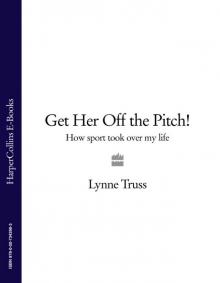 Get Her Off the Pitch! How Sport Took Over My Life
Get Her Off the Pitch! How Sport Took Over My Life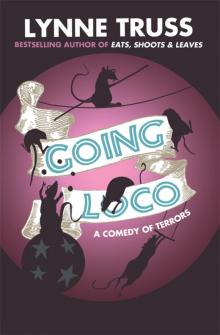 Going Loco
Going Loco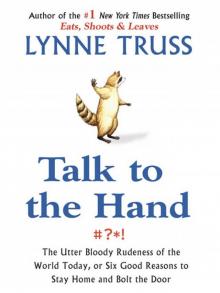 Talk to the Hand
Talk to the Hand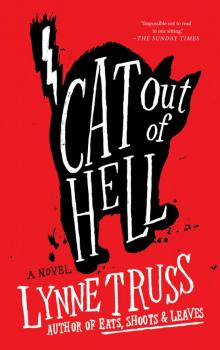 Cat Out of Hell
Cat Out of Hell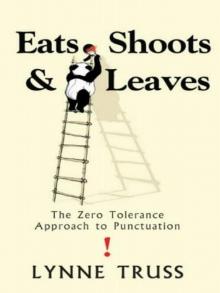 Eats, Shoots and Leaves
Eats, Shoots and Leaves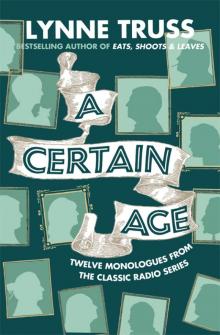 A Certain Age: Twelve Monologues From the Classic Radio Series
A Certain Age: Twelve Monologues From the Classic Radio Series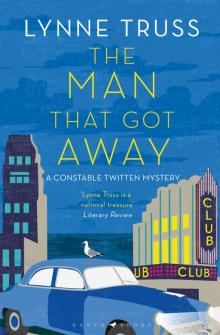 The Man That Got Away
The Man That Got Away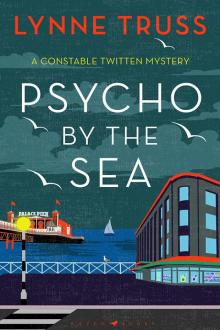 Psycho by the Sea
Psycho by the Sea With One Lousy Free Packet of Seed
With One Lousy Free Packet of Seed Tennyson's Gift: Stories From the Lynne Truss Omnibus, Book 2
Tennyson's Gift: Stories From the Lynne Truss Omnibus, Book 2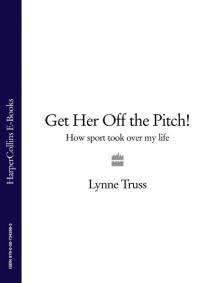 Get Her Off the Pitch!
Get Her Off the Pitch! Tennyson's Gift
Tennyson's Gift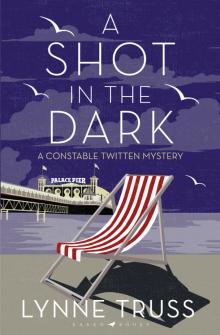 A Shot in the Dark
A Shot in the Dark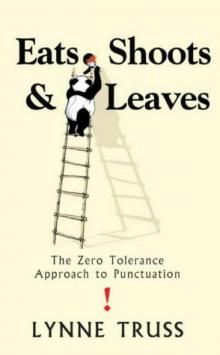 Eats, Shoots and Leaves: The Zero Tolerance Approach to Punctuation
Eats, Shoots and Leaves: The Zero Tolerance Approach to Punctuation